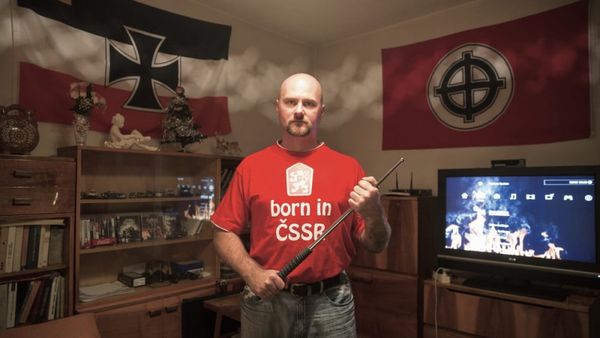Eye For Film >> Movies >> The White World According To Daliborek (2017) Film Review
The White World According To Daliborek
Reviewed by: Amber Wilkinson

Using a voice distorter, Dalibor K, the subject of this 'documentary play' by Vít Klusák announces: "Welcome to my world", urging his smattering of YouTube followers to "get on the path to evil".
It's so ridiculous that it could almost be parody and, yet, the thirtysomething Dalibor is the real neo-Nazi deal, at least in his head - his "kingdom", we soon come to realise, is his mother's house. It's a place ruled by her and steeped in the sharp tang of loneliness and boredom, where far-fight flags are pinned on walls behind china ballerinas and deer.

The 'play' element of the film means plenty of Dalibor 'acting' for the camera as we seem him working on a bizarre collection of videos, including staging scenes of killing his mother and of sleeping with a cuddly toy, but Klusák and his cinematographer Adam Krulis also capture plenty of unguarded moments - including Dalibor's obvious frustration when his mum opens the door for him at home as he inserts the key because she's been waiting for his return or the moment when he says, "Man is a hunter" as Krulis focuses his lens on a group of toy cars.
Although much of Dalibor's far-right spouting is utterly ludicrous - and very, very funny - there's a two-fold sense of horror lurking beneath the tragicomedy. Firstly, the views are abhorrent but, possibly worse than that, is the growing realisation that much of this is merely the adoption of a neo-Nazi persona for Dalibor, as he seeks to make some sort of impression on the world.
Equally depressing is the apparent normalisation of this viewpoint in small-town Czech Republic. One evening, when he's out espousing his views over a pint with mates, one of them says: "You're a neo-Nazi. That's nice", before steering the conversation in a different direction. When his views are challenged by others it's in half-hearted or downright odd ways, such as when his new girlfriend Jana, happy enough with his beliefs, instead chides him for "not being a man of action". Meanwhile, his mother's newly acquired internet boyfriend Vladimir seems happy to say almost anything right-wing if it will help him fit into the dynamic of the house. This psychological willingness to go along with an idea, however ludicrous, in order to avoid confrontation is likely to strike a chord with many in other countries currently grappling with how to deal with the rise of extremism.
In the film's epilogue, a controversial 'prop' tour bus emblazoned with the slogan: “Come to Auschwitz - A journey through emotions" may have been created solely for the film but the actual emotions that play out when Dalibor and his clan tour the camp are raw and real. Not least among these is the, apparently, genuine anger from the director, who is suddenly on the other side of the camera - for him, it seems this is not a play any more. It's only a shame that having 'broken' the rules in this way, he doesn't explore the aftermath further although the question of how far someone has to go before it is considered 'too far' is something we're all left thinking about.
Reviewed on: 03 Nov 2018














